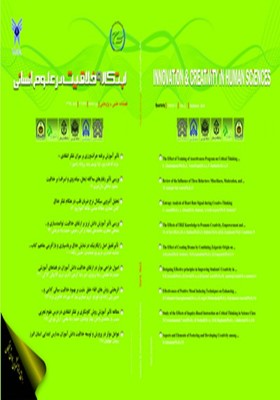The Effect of Creating Drama by Combining Zeigarnic Origin on the Memorization and Cognitive Recreating Concepts Lessons Hedyehaye Asemani
Subject Areas : Creativity and innovation from psychological, epistemological, educational and pedagogicalmaryam pourjamshidi 1 , جمشید حیدری 2 , حسین زنگنه 3
1 - دانشگاه بوعلی سینا
2 - دبیر/ آموزش و پرورش همدان
3 - هیات علمی/ دانشگاه بوعلی سینا
Keywords: zeigarnic origin, Memorization, Cognitive Recreating, Creating Drama,
Abstract :
The Effect of Creating Drama by Combining Zeigarnic Origin on the Memorization and Cognitive Recreating Concepts Lessons Hedyehaye Asemani. Abstract: Background: Teaching Method is one of the most important element Instructional Design Process that Impact of academic performance. Aim: The aim of present research was effect creating drama by combining zeigarnic origin on the memorization and cognitive recreating concepts lessons hedyehaye asemani. Method: The statistical population included all of the female fourth graders primary school students in Asad abad city in Hamedan. Among study population, 20 students were selected randomly by multiple cluster sampeling method divided into two groups (control and experimental). The instrument included the memorization questionnaire and cognitive recreating questionnaire in this research, before the start of training from both groups were tested.The control group were treated 8 concepts from lessons hedyehaye asemani with creating drama but the experimental group were treated by creating drama with combining zeigarnic origin method. Results: The results of data analysis through co-variance indicated that there was no significant difference between the control and experimental groups with regard to concept memorization but there was significant difference between the two groups in cognitive recreating concepts. Conclusions: As a result it can be claimed that creative drama with combining zeigarnic origin do have an outstanding effect on improving the students learning. Keywords: zeigarnic origin, Memorization, Cognitive Recreating, Creating Drama
استوار، نگار؛ غلام آزاد، سهیلا؛ و مصرآبادی، جواد (1391). تاثیرگذارى آموزش به روشِ تقسیم بندى دانش آموزان به گروه هاى پیشرو بر شاخص هاى شناختى، فراشناختى و عاطفى، در یادگیرى درس ریاضى. فصلنامةنوآوری هاى آموزشى، 11، (41)، 29 ـ 50.
چمبرز، دیویی (1970). قصه گویی و نمایش خلاق. (ترجمة: ثریا قزل ایاغ). تهران: مرکز نشر دانشگاهی.
رضوی، عباس (1386). مباحث نوین در فناوری آموزشی. اهواز: دانشگاه شهید چمران.
زارعی زوارکی، اسماعیل، نوروزی، داریوش، صفوی، محمدرضا. (1391). پرورش خلاقیت با بهره گیری از روش تدریس بدیعه پردازی در درس زبان انگلیسی. فصلنامه علمی و پژوهشی ابتکار و خلاقیت در علوم انسانی. 1، (4)، 65-83.
سیف، علی اکبر. (1387). روانشناسی پرورشی نوین: روانشناسی یادگیری و آموزش. (ویرایش ششم) تهران: دوران.
عسگری، محمد. سلطانی، محسن، یلفانی، ناهید (1393). اثربخشی آموزش نمایش خلاق بر خلاقیت دانش آموزان پیش دبستانی شهر همدان. فصلنامه علمی و پژوهشی ابتکار و خلاقیت در علوم انسانی. 3، (4) ، 35-54.
فردانش، هاشم. ( 1383). مبانی نظری تکنولوژی آموزشی. تهران: سمت.
قاسم تبار، نبی الله، الهو یردیانی، خلیل، حاجی تبار، محسن، محمد جانی، هیوا، و خسروی، فرزاد. (1390). تأثیر نمایش خلاق بر تحول اجتماعی کودکان پیش دبستانی. روانشناسیتحولی:روانشناسانایرانی، 8، (32)، 405 413.
منصور، محمود. (1386). روانشناسی ژنتیک. تهران: سمت.
مک کاسلین، نلی. (1390). درام خلاق. ( ترجمة: حسین فدایی حسین). تهران: نمایش.
نعیمی، فخرالزمان، زارع، حسین، هرمزی، محمود، شقاقی، فرهاد وکاوه، محمد حسین. (1391). مجله فناوری آموزش، 1، (7)، 23-32.
هرگنهان، بی. آر.، و السون، ام. اچ. (2001). مقدمه ای بر نظریه های یادگیری. (ترجمة علی اکبر سیف) (1382). تهران: دوران.
Cahit Kayhan, H. (2009). Creative drama in terms of retaining information.Procedia Social and Behavioral Sciences, 1,737–740.
Craft, A., Cremin, T., Hay, P., & Clack, J. (2014). Creative primary schools: developing and maintaining pedagogy for creativity. Ethnography and Education, 9(1), 16–34.
Adiguzel. H. A., Timuçin, E. (2010). The effect of creative drama on student achievement in the instruction of some development and learning theories. Procedia Social and Behavioral Sciences, 9, 1741–1746.
Erbay, F. S., & Doiru, S. Y. (2010). The effectiveness of creative drama education on the teaching of social communication skills in mainstreamed students. Procedia Social and Behavioral Sciences, 2, 4475–4479.
Khabiri, M., & Pakzad, M. (2012). The Effect of Teaching Critical Reading Strategies on EFL Learners’ Vocabulary Retention. The Journal of Teaching Language Skills. 4, 1, 73-106.
Ienguna, Y. i., iskenderoilua, T. (2010). A review of creative drama studies in math education: aim, data collection, data analyses, sample and conclusions of studies.Procedia Social and Behavioral Sciences, 9, 1214–1219.
Peter, M. (2003). Drama, Narrative an Early Learning. British Journal of Special Education, 30, 1, 21-27.
Simovska, V. Mannix McNamara, P. (2015). Schools for Health and Sustainability: Theory, Research and Practice. Springer.
Ulas, A., sevim, O. & Tan, S. (2011). Attitudes of pre-service teacher of Turkish language towards creative drama course. Procedia Social and Behavioral Sciences, 31, 362- 368.
Wenger, E. (2008) .Communities of practice: Learning, meaning, and identity. United Kingdom: Cambridge University Press.
_||_

